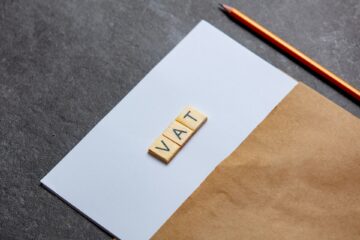Mastering VAT Registration in Thailand: A Comprehensive Guide for SMEs
Value-Added Tax (VAT) is an essential aspect of conducting business in Thailand, with most small and medium enterprises (SMEs) required to navigate the VAT registration process. Understanding the ins and outs of VAT registration can significantly impact your business’s financial and legal operations, ensuring compliance with Thai tax laws, and enhancing overall success. Therefore, mastering the VAT registration process is critical for any Thai SME owner.
Arming yourself with knowledge about VAT registration equips your Thai SME for improved financial accuracy, tax compliance, and overall success. Read on to delve into the critical aspects of VAT registration for SMEs in Thailand and discover how Plizz’s expert services can help simplify the process for your business, ensuring compliance and a stress-free experience.
VAT Basics: Understanding Value-Added Tax for Thai SMEs
Before diving into the registration process, it’s essential to grasp the fundamentals of Value-Added Tax in Thailand. VAT is an indirect tax imposed on the consumption of goods and services in the country. The standard VAT rate in Thailand is currently 7%. However, some exemptions may apply to certain goods and services. Becoming a VAT-registered business benefits Thai SMEs by enabling them to claim input tax credits while ensuring compliance with tax laws.
Key aspects to consider when evaluating VAT registration options for your Thai SME include:
1. Threshold: Thailand currently sets the annual revenue threshold for compulsory VAT registration at 1.8 million baht.
2. Voluntary Registration: SMEs with revenue below the threshold can opt for voluntary VAT registration, which grants input tax credit benefits while imposing additional administrative requirements.
3. VAT Exemptions: Certain goods and services, such as education, healthcare, and cultural services, are exempt from VAT. Ensure to verify whether your business is required to register for VAT in Thailand.
The Registration Process: Step-by-Step Guide for Thai SMEs
The VAT registration process in Thailand involves several crucial steps to ensure your SME complies with tax laws and properly benefits from input tax credits. These steps include:
1. Application Submission: Thai SMEs must submit a completed VAT registration application (Form Phor.Phor.01) to their Revenue District Office. This application typically requires essential company information, including registration number, business name, and registered office address.
2. Documentation: As part of the application, Thai SMEs must provide supplementary documentation such as company registration certification, identification of authorized directors, and VAT power of attorney forms.
3. Interview: Once the application is submitted, the company’s representative must attend an interview at the Revenue District Office to verify the accuracy of the submitted details.
4. Tax Identification Number (TIN): Upon successful registration, the Revenue District Office will issue a Tax Identification Number, which serves as the company’s VAT identification in Thailand.
Post-Registration Tasks: Ensuring Compliance and Proper Tax Management
Once your Thai SME is registered for VAT, several responsibilities and tasks must be fulfilled to maintain compliance and manage your business’s tax obligations effectively:
1. Filing VAT Returns: VAT-registered businesses in Thailand must file monthly VAT returns with the Revenue Department using Form Phor.Phor.30. This filing is due on the 23rd day of the following taxable month and includes reporting output tax and claiming input tax credits.
2. Record Keeping: Thai SMEs must maintain accurate records of VAT transactions for a minimum of five years. These records can be inspected by tax authorities and are essential for proper tax compliance.
3. VAT Refunds: If your SME’s input tax exceeds output tax, you may be eligible for a VAT refund. To claim a refund, the company must submit a VAT refund form (Form Phor.Phor.26) and provide supporting documentation.
4. Updates and Changes: Any changes to the company’s circumstances, such as changes in address or business activities, must be reported to the relevant tax authorities within 15 days.
Plizz’s Expert Assistance: Streamlining VAT Registration for Thai SMEs
Partnering with Plizz for your VAT registration ensures expert guidance and support, simplifying the process and guaranteeing compliance for your Thai SME:
1. Application Preparation: Plizz assists with preparing and submitting the VAT registration application, ensuring all required documentation is accurate and complete.
2. Customized Solutions: Plizz tailors its services to your company’s unique needs, providing specific advice and support catered to your SME’s circumstances.
3. Post-Registration Support: With Plizz’s continued assistance, your Thai SME can confidently tackle post-registration tasks such as VAT return filing and record keeping.
4. Ease of Mind: With Plizz managing VAT registration and compliance, business owners can focus on their core business operations without the stress of navigating complex tax requirements.
Master VAT Registration with Plizz’s Expert Support
Thorough understanding of VAT registration is essential for Thai SME owners seeking to maintain compliance with tax laws and maximize their business’s financial success. By becoming familiar with VAT registration basics and the process involved, SMEs can tackle taxation challenges with confidence.
Plizz’s expert services ensure your business navigates VAT registration and compliance smoothly and efficiently. Reach out to Plizz to explore our comprehensive range of solutions and learn how our expertise can assist with your Thai SME’s VAT registration journey, guaranteeing stress-free operation and compliance.



0 Comments